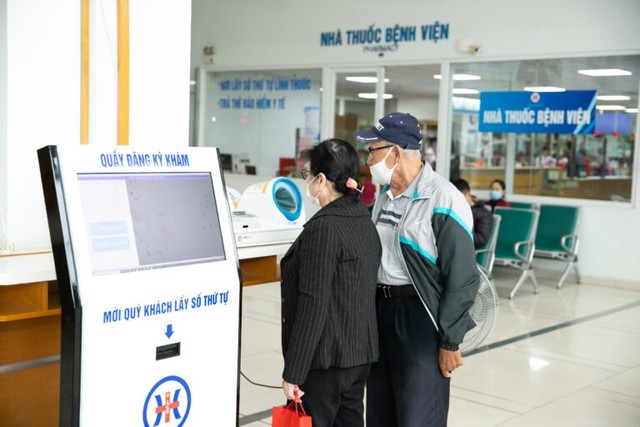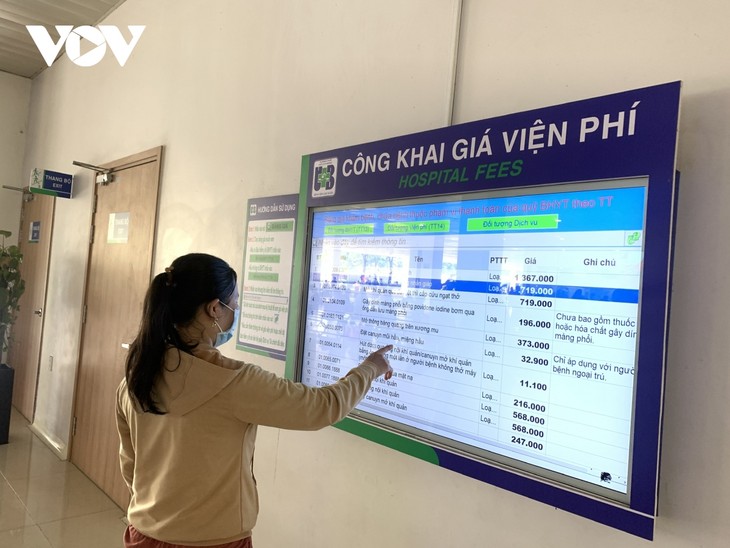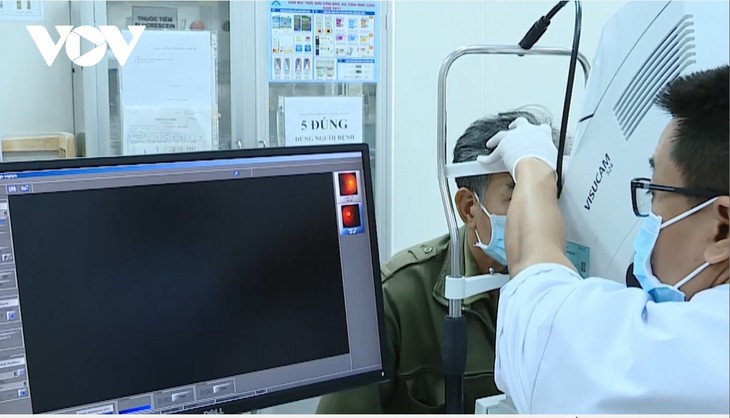(VOVWORLD) - In response to the government’s digital transformation project, Ho Chi Minh city will launch two key activities in the health sector this year. The first is building an e-health records system for the people and the second is a shared database for the health sector.
 People get order number for their check-up at a hospital’s automatic machine. (Photo: chinhphu.vn) People get order number for their check-up at a hospital’s automatic machine. (Photo: chinhphu.vn) |
Nguyen Thi Bich Thu of Go Vap district said that she went to the Nhan Dan Gia Dinh Hospital where a receptionist instructed her to take her fingerprints and register, checked her personal information, including her health insurance number. Then she chose the medical check-up section and waited for her turn.
Thu said the procedures were simple and convenient.
“The hospital uses fingerprints for check-in, which is quicker and more convenient. I didn’t have to wait long at the reception counter. I registered by myself because there are instructions available. I found it very satisfying. Within just a minute I can pay the examination fee without having to go to the financial counter and wait further as before. The hospital receives a large number of patients.”
Once their fingerprints have been taken, patients only need to scan their fingerprints at subsequent visits, for registration because their personal information and medical records have been stored on the system.
Doctor Nguyen Thi My Linh, Head of the Department of Medical Examination at Nhan Dan Gia Dinh Hospital, said about 20,000 people with health insurance cards have registered their fingerprints for medical treatment. Whenever they visit the hospital, it takes the patient about a 1 minute to get their order number for their check-up.
“Taking fingerprints at the smart reception kiosks has increased patients’ satisfaction. Furthermore, it also ensures treatment for patients having insurance cards according to regulations and avoids improper use of the health insurance cards,” said Dr. Linh.
 A visitor checks hospital fees at Oncology Hospital 2 in Thu Duc City. (Photo: Kim Dung) A visitor checks hospital fees at Oncology Hospital 2 in Thu Duc City. (Photo: Kim Dung) |
Oncology Hospital 2 in Thu Duc City has applied digital transformation to medical examination and treatment since April. The hospital has completed the electronic medical record system, synchronizing patients’ test results and other data. The hospital is cooperating with research facilities to develop image-processing software for automatic segmentation of tumors, pathology software to analyze and interpret data quickly, and therapy software with treatment planning.
Currently Oncology Hospital 2 receives 75‑80% of patients from neighboring provinces and cities, and 20‑25% are HCM city dwellers. Tele-medical consultation, examination, and treatmentare considered important methods to eliminate physical communication bottlenecks and reduce problems of geographical distance.
Doctors at Ho Chi Minh City Eye Hospital have developed the EyeDr software for early screening of glaucoma with faster and more accurate results. This is the first artificial intelligence solution applied in practice in Vietnam’s ophthalmology sector.
 A doctor at Ho Chi Minh City Eye Hospital uses EyeDr software for early screening of glaucoma. (Photo: Kim Dung) A doctor at Ho Chi Minh City Eye Hospital uses EyeDr software for early screening of glaucoma. (Photo: Kim Dung) |
Last March the EyeDr solution was approved by the Ho Chi Minh City Science and Technology Council and the Medical Ethics Council of Ho Chi Minh City Eye Hospital. This application is much faster than the 45 seconds it takes an ophthalmologist specializing in glaucoma to examine, or the 6‑8 minutes by a regular ophthalmologist.
AI “assistant” EyeDr also helps doctors and specialists engage in tele‑consultancy, examination, and treatment more quickly and easily, while patients can save time and travel cost.
Doctor Le Anh Tuan, Director of the Ho Chi Minh City Eye Hospital, said the initial positive results are attributed to the hospital’s public investment in information technology. Digital transformation must be considered one of the key activities in the hospital’s annual plan, together with human resource training and information technology infrastructure development.
“Human resources are the key factor. If you want good digital transformation, you must train digital people. We also need a strategy and plan to implement digital transformation in a scientific and long‑term manner. Our hospital has started to design an IT system to serve digital transformation," Doctor Tuan said.
Obviously, digital transformation and IT application in management, administration, and patient service have significantly improved the hospitals’ delivery of services. HCM city is gearing up to build smart hospitals in the near future.